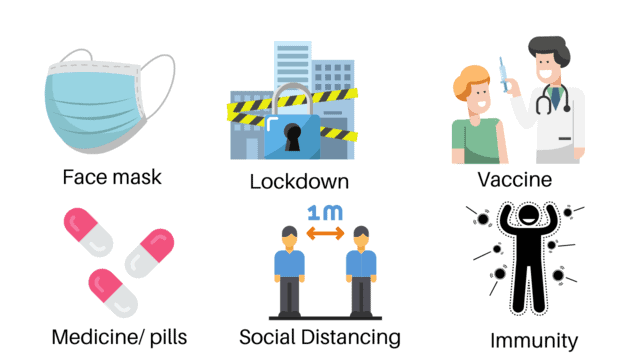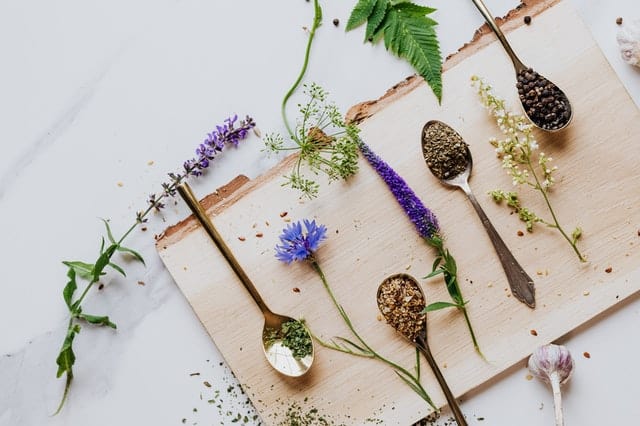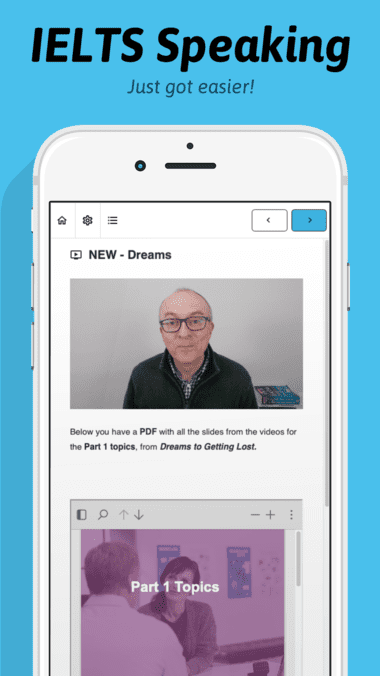👇 Take this lesson with you! 👇
The topic of Medicine in IELTS Speaking is quite tricky and may need quite a lot of less common vocabulary. You may be asked to talk about health, different kinds of medicine, attitudes to alternative medicine, and of course the impact of COVID on society.
This free IELTS Speaking lesson will give you exactly the language and idioms you need to talk fluently on the topic of medicine in the IELTS Speaking test.
Table of Contents
Medicine vocabulary IELTS
For very technical topics, like medicine, science or technology, you don’t need to know all the technical language or ideas, but you do need to know the basics.
A useful phrase to use with the examiner is the following. It shows off good English and sounds very natural.
I’m not an expert, but I think….
Or…
I’m by no means an expert, but I think….
When you have a health problem inside your body, we use the following words:
Sickness / illness / ailment / disease
A disease tends to be long term
A chronic disease = there is no cure for it
Examples of illnesses are:
- A cold (you have a runny nose, you’re sniffing and coughing)
- The flu (you have a fever, you have a high temperature, you are sweating)
- a bug (a bacteria)
- a virus (it is highly contagious)
- an infection (n.)
I’ve got a / an _______
I’ve caught a ________
I’ve caught a cold and now I have a high temperature. I might have a fever.
When you have a health problem outside your body, we use the following:
Injury
- a broken bone
- a cut
- a burn
- a sprained ankle / twisted ankle
Medicine (n.)
1) Something you take to cure an illness
2) a field of study
Medication (n.)
Something you take to cure an illness (same as medication)
We buy medicine in a ….
- Chemist (GB)
- Pharmacy (US)
- Drug store (US)
Different types of medicine
- Pills
- Syrups
- Creams
- Antibiotics (to tackle infections)
- Vaccines (to treat viruses)
Vaccines give us immunity (n.)
Vaccines build our immunity (n.)
A strong / weak immune (adj.) system
The doctor looked at my symptoms, diagnosed me, and then prescribed some medicine
She put me on a course of antibiotics
I need to take some medicine

COVID vocabulary for IELTS Speaking
Here are some words and phrases you can use to talk about COVID
I hate wearing a face mask
This vaccine can boost your immunity
Social distancing is really important
I don’t like taking pills, especially capsules
Lockdown or confinement have meant we have had to spend a lot of time at home, without going out to socialise.
Quarantine is needed for anyone coming into the country with a fever.
Some older people choose self-isolation to keep themselves safe.
The Covid pandemic has changed our lives significantly
Find more great vocabulary to talk about COVID here
https://www.esolcourses.com/content/topics/health/vocabulary/viral-illnesses.html
Debates and discussions about medicine
How COVID has changed the way we live
Here are some nice phrases you can use to discuss this issue
- I cannot socialise as much as I used to
- I have to stay isolated at home and I have become a couch potato (=lazy)
- Many people have started working from home
- A lot of people have been laid off or made redundant, and so lost their main sources of income
- I have started studying more online
- My whole schooling has moved online
- Before I could travel anywhere quite freely, no there are lots of restrictions on travel, especially international travel
- It has completely transformed my daily routine, now I feel I am in a bit of a rut (=stuck in the same boring routine)
- It has turned my life upside down. Now I cannot visit my family due to lockdown and so I feel quite lonely.
- It has forced my to wear a face mask all the time. I am really a lot more cautious and careful about general hygiene now
- It’s not only affected me personally, but the whole economy, so we are heading for a recession now (=bad economic situation)
- COVID has killed off the livelihood of many people, learning them feeling hopeless and even depressed.

Alternative medicines
The following are some of the more common and well known alternative medicines.
Most of them take a holistic approach to treating the body and also tend to focus on preventing disease rather than treating it after it happens.
- Herbal medicine – using plants
- Acupuncture – using needles to touch pressure points
- Ayurveda – ancient herbal-based medicine
- Homeopathy – lets the body cure/heal itself using tiny amounts of natural medicine (plants and minerals)
- Chiropractic – aligning bones, muscles through manipulation
- Chinese medicine – (TCM) use of natural plants and herbs to prevent illness and achieve a balance of energy or ‘Qi’ in the body.
IN FAVOUR
- I actually trust these alternative approaches more than modern medicine, I mean they have been around a long time and are tried and tested.
- I think they are great, as they take a holistic look at your body, so they make sense to me.
- I suppose some of them are good, for example, I have done acupuncture and it worked for me. Maybe they are a good complement to modern medicine.
- I think they tend to be more popular with the older generation, but younger people tend to favour more modern approaches to medicine
AGAINST
- To be honest, I am a bit sceptical, they don’t seem to be science-based to me, so I don’t know if they really work
- I think they are mumbo jumbo (=nonsense), I mean they is no scientific evidence that they work
- I am in two minds about it, some people swear by homeopathy, but I wonder if it just works like a placebo (=a fake medicine that works because you believe it is a real medicine)
- The only evidence that they work is anecdotal, I don’t think they are very scientific
Idioms to talk about medicine
The following expressions are used to talk about not feeling well, or feeling a little sick.
- I feel under the weather
- I feel off
- I fell off colour
I have a splitting headache = a terrible headache
You look as pale as ghost = you don’t look well
The following expressions are used to talk about recovering and feeling healthy again.
- The doctor gave me a clean bill of health
- I feel as fit as a fiddle = to be healthy
- I feel fighting fit = to be healthy
- To be on the mend = to be recovering
- to be back on my feet = = to have recovered from a sickness
- He is the picture of health = he looks very healthy
Student's questions about medicine
Keith, do you think health is important?
Absolutely, to be honest, I think health is probably one of the most important things in our life.
I mean sure, things like family, friends, and money, and wealth, job security are all pretty important, but if you don’t have your health, then you can’t make the most of any of those other things.
So, I think it’s essential that we look after our health and that we try to stay fighting fit.
You know, that if ever we do feel under the weather that to take some kind of medicine to try and sort yourself out, so that you will be as fit as a fiddle and then enjoy life a lot more.
Have you used alternative medicine?
It’s an interesting question. The short answer is, yes, I have!
I am a real advocate of (=I am a fan of) using a holistic approach to staying healthy, preventing disease, as well as treating disease.
So, of course if you fall sick, I do sometimes take medicine whether it’s pills or antibiotics, but I have also used different kinds of alternative medicine.
I’ve been treated by a ‘Chiro practitioner’ (we should say “chiropractor”) who did manipulation of my bones to help me when I had back problems. I have also had acupuncture and that was interesting because it’s quite strange having needles put into your body on different pressure points and then waiting for the impact, and of course, you don’t feel the direct impact.
I think, as with a lot of alternative medicines, it takes a long time for the body to regain balance and so you don’t have an immediate impact, but long term, yes it can help so.
So, yes I …, for me it’s not a choice one or the other, I use a lot different kinds of medicine.
More live lessons for you
If you liked this lesson, leave a comment below!
There are more lessons you can follow in the links below too.
KEEPING FIT in IELTS Speaking. Learn different types of activities we do to keep fit and the language you need to talk about them
SCIENCE in IELTS Speaking. Learn vocabulary and idioms to talk about different branches of science you like and get ideas to talk about.
RECYCLING in IELTS Speaking. Useful collocations and vocabulary to help you discuss about recycling.


hi keith can we say consume some medicine instead of take?
Consuming medicine does not have the same meaning as taking medicine. Taking medicine is the action of putting the medicine into your mouth and swallow it (usually with some water). Consuming medicine sounds like the medicine is a product on the market and consumers buy it. It does not seem right to me, at least.
It’s a fair point – ‘consume’ medicine could mean ‘buy’. It’s true, we do generally say to ‘take’ medicine when we swallow it.
Can i have the pdf for the Lecture of Health.
You are such a great teacher, dedication and devotion.
Thank you for all your hardword and your time
Sure I have just emailed it to you. Glad you like the classes.
you’re one of the best English teacher i have ever seen. you are funny but i enjoy your teaching so much.
So pleased to hear that – thank you!